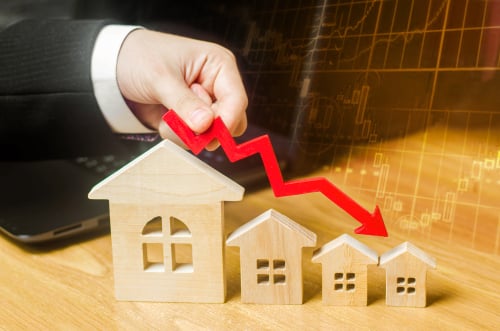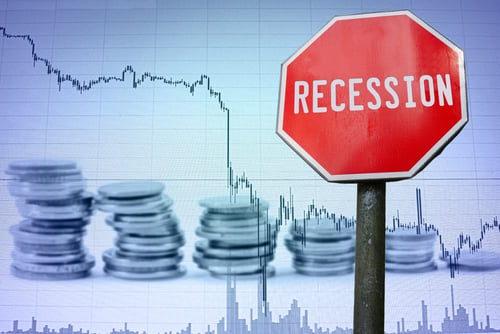Fears of a recession can cause worry for investors. However, some US cities can weather a recession, which means investors may be able to capitalize on new investment opportunities. Just keep reading if you want to know what happens during a recession and how real estate investors can weather it.
What Happens During a Recession?
A recession is when the economy declines for an extended period of time. During a recession, there are higher levels of unemployment, GDP contraction, and less consumer spending. In addition, due to increased prices, many people lose their jobs and find it hard to pay for their usual expenses.
A recession may last anywhere from 6 to 18 months, depending on the severity of the economic downturn and the measures taken by the government to prevent or control it. It’s common to see stock prices fall and unemployment rates rise during a recession. Additionally, many businesses will lose customers, making keeping employees and maintaining a healthy business difficult.
The last major recession was in December 2007 and lasted until June 2009, called The Great Recession. This was the most prolonged recession since WWII, which some experts believe resulted from the US real estate bubble burst. Now, some investors predict the same thing will happen in the near future.
Why are Investors Predicting a Recession?
With inflation at a 40-year high, some investors are predicting a recession. However, it’s unlikely that we’ll see a similar housing market crash to that of The Great Recession since the economic factors are much different this time around. Nevertheless, a recession or significant economic downturn can majorly impact some housing markets.

Recessions aren’t necessarily predictable, but a few warning signs make it easier to determine an incoming recession. For instance, some leading indicators of a recession include:
- Soaring inflation
- Stagnate stock market
- Rising interest rates
- High unemployment rates
- Decline in GDP
- Less consumer spending
- Falling asset prices
If most of these scenarios happen simultaneously, it’s a major sign of a recession. However, some US cities can push through a recession and provide investment opportunities for rental investors. Here are some of the top US cities that may weather a recession.
The COVID-19 pandemic created several financial and economic issues throughout the US, as businesses were shutting down, people lost their jobs, and the government put stay-at-home orders in place. Now, as the economy is slowly recovering, inflation has taken over.
However, there are still some investment opportunities for investors looking to grow their rental business. Here are some states to consider for your next investments.
Which US Cities Still Provide Investment Opportunities?
Not every housing market will be affected by a recession or economic downturn. More affordable markets will weather a recession better than high-end markets with higher demand. Some US cities that may provide investment opportunities despite a recession include:
- Chicago, Illinois
- Kansas City, Missouri
- Columbus, Ohio
- Cincinnati, Ohio
- Cleveland, Ohio
- Montgomery County, Pennsylvania
- Philadelphia, Pennsylvania
- Boston, Massachusetts
These cities remain resilient against a recession because they have lower unemployment rates, and some are more affordable than other US cities’ markets. As for the more expensive markets, like Boston and Chicago, the home loan to value ratio remains high compared to other markets.
Essentially, cities where a recession won’t cause homes to decrease in value, will do better throughout it. On the other hand, states and cities where housing is expensive and rapidly rising will have a more challenging time staying afloat during a recession.
As such, real estate owners must look for these advantages and make wise investments, even during a recession. Assets that can hold their value and withstand a recession without losing value are critical.
States That May Struggle During a Recession

It’s clear that some states will do better than others during an economic downturn. After all, each state has differing factors that greatly affect its economic well-being. Some states that may have a harder time during a recession include:
- Florida
- Hawaii
- Nevada
- Arizona
- Kentucky
- Idaho
- Arkansas
- Maine
- New Mexico
- Mississippi
Although there may be investment opportunities within these states, it’s best to look at the factors that make it harder to weather a recession. For instance, most of these states have declining GDP, higher unemployment rates, and low unemployment insurance coverage.
Additionally, states with higher income tax rates and a lack of affordable homes can struggle during a recession. After all, if most people can’t afford a home at the median price, it’s not a good sign for the state’s economic health.
How to Determine Which States Can Weather a Recession
Several key factors are needed to determine which cities and states can weather a recession. Some of the main points to look at include:
- Debt-to-Income Ratio– Determines how lower-income households will react to a recession.
- Unemployment Rates– Gives a good idea of a state’s overall economic health.
- Housing Affordability– This shows the affordability of living in each state or city; The better the affordability, the more likely to weather a recession.
- Unemployment Insurance Coverage– Estimates the effectiveness of each state or city’s unemployment system. Good unemployment insurance coverage is better for a recession.
- State Income Tax Rates– Lower tax rates make it easier for certain states or cities to weather a recession.
- GDP of Each State– The gross domestic product shows the strength of each state’s economic output. Higher GDP is better for making it through a recession.
- Size of Government Reserves– This shows the state’s monetary reserves compared to government spending, determining how well a state would do without funding.
Combining all of these factors makes it easier to determine which states will hold up during an economic downturn. Ultimately, if a state lacks the funding or economic stability to withstand a recession, think twice before investing in these areas.
How Can Investors Make It Through a Recession?

Some real estate investors can weather a recession for several reasons. For one, a recession will generally directly affect the stock market, not the housing market. Although it can have some negative effects, the stock and real estate markets typically don’t correlate.
Additionally, people are always going to need rental homes. You typically won’t be left without tenants for an extended period of time. After all, the demand for rental homes may even increase during a recession.
You may need to adjust your rental prices to match the housing market demand. If you have an excellent Philadelphia property management team on your side, they can help you manage your investments while you seek new investment opportunities.
Although a recession doesn’t always mean a drop in home values, it may be easier to purchase real estate if it cools down the housing market. As a result, if home prices drop, investors may be able to snag rental properties at low prices.
Overall, real estate investors are more likely to weather a recession than other investors.
How Can You Protect Your Investments?
If you want to protect your real estate investments all year round, keeping your tenants happy and your rentals well-maintained is essential. One of the best ways to protect your investments is by hiring comprehensive property management services. After all, not every landlord has the time to manage every rental property that they own.
Bay Property Management Group offers full-service management, including tenant screening, rent collection, rental registration, maintenance, and more. These services are crucial to your rental property business. Contact BMG today if you need rental property management in Baltimore, Philadelphia, Northern Virginia, and Washington DC.

